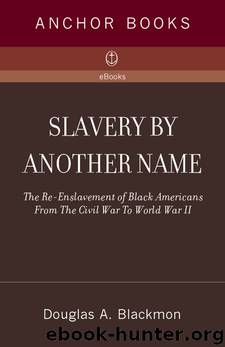Slavery by Another Name: The Re-Enslavement of Black Americans from the Civil War to World War II

Author:Douglas A. Blackmon [Blackmon, Douglas A.]
Language: eng
Format: epub
ISBN: 978-0-307-47247-2
Publisher: Anchor Books
Published: 2008-06-07T16:00:00+00:00
IX
A RIVER OF ANGER
The South Is "an armed camp."
In the three months since Reese began his slavery investigation, the guilt of every defendant called to court had in one manner or another been established. He'd won the personal attention and support of the U.S. attorney general and of President Roosevelt himself. Indeed, a new position had just been created in his office to oversee an even more expansive attack on slavery. Reese believed history, and the power of the nation, were with him. Even rabidly anti-black, white supremacist politicians and newspapers such as the Montgomery Advertiser initially reacted with embarrassment to the peonage charges that so suddenly burst into the public eye.
In truth, the mistrial in the case of Fletcher Turner marked an ominous reversal. Resentment to the exposure of the new slavery was growing. Other voices, defiant and rancorous, began to rise.
On the Saturday before Turner's surprise guilty plea, Alabama secretary of state Heflin spoke to an annual reunion of Confederate veterans in the town of Luverne, issuing a ringing endorsement of how men such as Pace and Turner had nobly returned black workers to their proper position as slaves and attacking Reese and Judge Jones as willing to sacrifice the honor of southern whites in return for advancement under President Roosevelt. They were nest foulers and "nigger lovers," cried supporters of the accused. Heflin and his allies said any man who did not defy them deserved all the contempt of the white South.
Reese and Heflin traded charges through the newspapers—the U.S. attorney asserting that Heflin deceitfully mischaracterized the facts of the case; Heflin, annealing his coarse racism in the language of the U.S. Constitution, retorted that Judge Jones was usurping the American ideals of trials by jury. 1
While the Turner trial was under way, a frenzied mob in Scottsboro, Alabama, gunned down the town sheriff in front of his family as he refused to turn over a black teenager who had allegedly "attempted criminal assault" on a nineteen-year-old white girl. Once the sheriff was dead, the black man was seized from his cell and hanged from a telegraph pole that night.
Midway through the trial, a lawyer in Dothan, Alabama, telegraphed Reese to report that a client, Enoch Patterson, was being held in peonage by the town's chief of police. Obviously, no local system of justice was available to defend Patterson. "I have no redress here for his wrongs," the lawyer wrote. "I know of no way to get justice for him but to submit the matter to you."2 Similar charges flowed into his office, so numerous and substantial that Reese—already frenzied with the duties of the trial and other indictments—could barely manage to send acknowledgments of the information, much less open investigations.
In Georgia, allegations surfaced in the court of Judge Emory Speer, in the cotton-dense version of that state's Black Belt, that the family of state representative Edward McRee, one of the most prominent in the state, was operating a slave plantation even more expansive and brutal than anything alleged in Tallapoosa County.
Download
This site does not store any files on its server. We only index and link to content provided by other sites. Please contact the content providers to delete copyright contents if any and email us, we'll remove relevant links or contents immediately.
| African-American Studies | Asian American Studies |
| Disabled | Ethnic Studies |
| Hispanic American Studies | LGBT |
| Minority Studies | Native American Studies |
Cecilia; Or, Memoirs of an Heiress — Volume 1 by Fanny Burney(32548)
Cecilia; Or, Memoirs of an Heiress — Volume 2 by Fanny Burney(31947)
Cecilia; Or, Memoirs of an Heiress — Volume 3 by Fanny Burney(31932)
The Great Music City by Andrea Baker(31917)
We're Going to Need More Wine by Gabrielle Union(19035)
All the Missing Girls by Megan Miranda(15961)
Pimp by Iceberg Slim(14489)
Bombshells: Glamour Girls of a Lifetime by Sullivan Steve(14058)
For the Love of Europe by Rick Steves(13933)
Talking to Strangers by Malcolm Gladwell(13350)
Norse Mythology by Gaiman Neil(13349)
Fifty Shades Freed by E L James(13233)
Mindhunter: Inside the FBI's Elite Serial Crime Unit by John E. Douglas & Mark Olshaker(9324)
Crazy Rich Asians by Kevin Kwan(9280)
The Lost Art of Listening by Michael P. Nichols(7494)
Enlightenment Now: The Case for Reason, Science, Humanism, and Progress by Steven Pinker(7306)
The Four Agreements by Don Miguel Ruiz(6745)
Bad Blood by John Carreyrou(6611)
Weapons of Math Destruction by Cathy O'Neil(6267)
